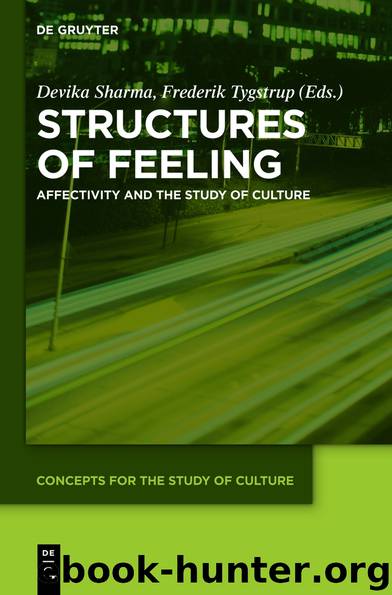Structures of Feeling: Affectivity and the Study of Culture (Concepts for the Study of Culture (CSC)) by Devika Sharma & Frederik Tygstrup

Author:Devika Sharma & Frederik Tygstrup [Sharma, Devika & Tygstrup, Frederik]
Language: eng
Format: epub
ISBN: 9783110369519
Amazon: 3110369516
Publisher: Walter de Gruyter
Published: 2015-01-29T06:00:00+00:00
At the same time, however, Morden finds these once familiar surroundings disturbing, and “experience[s] a sense almost of panic” (156) as he becomes aware of the “incongruence of actual and remembered realities” (Rostek 2011, 157): “Everything was slightly out of scale, all angles slightly out of true.” (Banville 2005, 156) Despite his desperate search for a place of belonging – “I was determinedly on my way somewhere, going home, it seemed, although I did not know what or where exactly home might be” (24) – Morden remains homeless until the end of the novel, when his daughter Claire takes him home: “home she says!” (259)
Another aspect that deserves further consideration from an affective-narratological point of view is focalisation, that is to say, the question of whose cognitive, emotional, and perceptual perspective orients the narrative. Since remembering inevitably involves adapting an original experience to present needs, one has to distinguish between the emotions actually felt at a certain point in time and their necessarily retrospective narrativisation. When looking at the interplay between Morden’s earlier selves and the narrating self, one realises that his past and present vantage points often overlap: many passages are ‘doubly focalized’ (cf. Phelan 2001, 60; Birke 2008, 72–79) insofar as they contain traces of both past and present selves. The fact that Morden’s different self-perspectives both intersect and diverge shows him as oscillating between an emotionally involved and a distanced, detached stance towards his memories. On the one hand, past moments are disturbingly real and accessible to the narrator in his here-and-now, but on the other, he constantly questions the accuracy of his account, with the effect of creating distance.67 At times, “the past has a force so strong it seems [he] might be annihilated by it” (Banville 2005, 47). Field memories reproduce former emotions and perceptions in such a way as to create the impression of a tangible, immediate past (cf. Neumann 2005, 30–31, 172–73); when recounting emotionally intense situations, Morden sometimes even switches to the present tense. Moments in which the narrating ‘I’ steps back completely are, however, rare. Large parts of the story are filtered through the consciousness of his present self, who zooms out of the narrative to take an observer-perspective on his former vantage point, thus dissociating his different selves. Many episodes in the novel illustrate how difficult it is for Morden “to speak as [he] spoke then” (Banville 2005, 34): “Where am I, lurking in what place of vantage?” (10) What is more, there are also instances in the narrative present in which the narrator sees himself “as if from [the] outside” (193), “at a distance, being someone else and doing things that only someone else would do” (43). In short, Morden’s crisis of loss turns out to be, in essence, a crisis of identity. As “a distinct no one” who “never had a personality” (216), he has always defined himself through his relationships with others. With Anna gone, he now faces the twofold task of dealing with bereavement and of (re) establishing a sense of self.
Download
This site does not store any files on its server. We only index and link to content provided by other sites. Please contact the content providers to delete copyright contents if any and email us, we'll remove relevant links or contents immediately.
The Art of Boudoir Photography: How to Create Stunning Photographs of Women by Christa Meola(18614)
Red Sparrow by Jason Matthews(5467)
Harry Potter 02 & The Chamber Of Secrets (Illustrated) by J.K. Rowling(3673)
In a Sunburned Country by Bill Bryson(3537)
Drawing Cutting Edge Anatomy by Christopher Hart(3523)
Figure Drawing for Artists by Steve Huston(3446)
Harry Potter and the Prisoner of Azkaban (Book 3) by J. K. Rowling(3350)
The Daily Stoic by Holiday Ryan & Hanselman Stephen(3301)
Japanese Design by Patricia J. Graham(3167)
The Roots of Romanticism (Second Edition) by Berlin Isaiah Hardy Henry Gray John(2913)
Make Comics Like the Pros by Greg Pak(2912)
Stacked Decks by The Rotenberg Collection(2880)
Harry Potter and the Deathly Hallows (7) by J.K. Rowling(2714)
Draw-A-Saurus by James Silvani(2711)
Tattoo Art by Doralba Picerno(2661)
On Photography by Susan Sontag(2631)
Churchill by Paul Johnson(2578)
The Daily Stoic by Ryan Holiday & Stephen Hanselman(2569)
Drawing and Painting Birds by Tim Wootton(2509)
